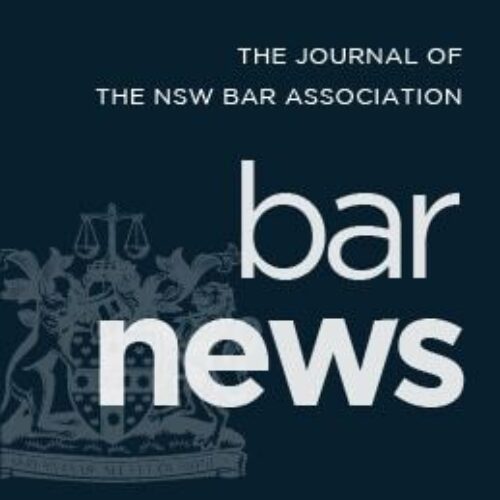- Winter 2022
- The LGBTQI Principles on Inclusiveness

In 24 February 2022, the Bar Council approved the adoption of the Lesbian, Gay, Bisexual, Transgender, Queer, Questioning and Intersex (LGBTQI) Principles on Inclusiveness (the principles). The principles are intended as a voluntary guide to be adopted by chambers and floors. This article describes their historical development, rationale and purpose, content and measures of prospective implementation.
What’s the background?
The principles were drafted by the Diversity and Equality Committee with the assistance of Andrew Pickles SC, the former advocate for change for LGBTQI diversity and the AIDS Council of NSW (ACON), a health promotion organisation specialising in HIV prevention and support for the NSW LGBTQI community.
There is currently no national equivalent of the principles published by other Australian Bar associations and law societies. There are, however, many guidelines, codes, policies and other documents about LGBTQI issues, including materials directed at lawyers practising in Australia and elsewhere.
For example, the Law Council of Australia recognises that diversity benefits the Australian legal profession and the community as a whole. Its diversity and equality charter calls upon the legal profession to treat all people with respect and dignity, foster a supportive environment for all individuals to realise their maximum potential regardless of difference, and to respect a diverse range of individuals and views. The Law Council has also issued guidance on how to make a legal practice LGBTQI-friendly. In addition, in 2019 the Australian Human Rights Commission produced guidelines for the inclusion of transgender and gender diverse people in sport.

Why have principles with an LGBTQI focus?
The principles were developed to promote objectives in the Bar Association’s 2021–25 strategic plan. The strategic plan demonstrates a commitment to improving and supporting diversity at the bar so that it represents and supports the society it serves. The strategic plan also encourages initiatives that promote equality of opportunity in the practise of law regardless of inter alia gender and sexual orientation. The Bar Association is also a longstanding member of Pride in Diversity, the only national not-for-profit training support program for LGBTQI workplace inclusion.
Codes of conduct, guidelines and similar instruments can be valuable tools to promote inclusivity. Internally, these documents benchmark an organisation’s mission, values and commitments, articulate the behavioural standards expected of individuals and inform daily decision-making. Externally, codes can facilitate marketing opportunities, risk mitigation and legal compliance.
There are many good reasons for having a code of conduct, guideline or equivalent instrument like the principles. Many LGBTQI individuals continue to experience discrimination, harassment and hostility, including at work. Poor health outcomes (including anxiety and depression) are often directly related to experiences of prejudice, bullying, harassment, discrimination or abuse on the basis of being LGBTQI.
Some individuals might hide their sexual orientation or gender identity because they fear stigma or discrimination. However, concealing oneself can compromise wellbeing, job satisfaction and productivity. During this year’s practising certificate renewal, a voluntary survey asked whether the barrister had any LGBTQI orientation and whether they were comfortable if their colleagues knew. The ability to bring all of oneself to work enhances individual innovation, team performance and ultimately client service.
There are a number of legal organisations which have already developed their own codes of conduct. For example, the Women Lawyers Association of New South Wales adopted a code of conduct in 2020. Within the LGBTQI field, several leading chambers in the United Kingdom have developed their own equality, diversity and inclusion policies, codes or strategic plans and some are signatories to the FreeBar Charter. In addition, organisations in Australia such as the Equality Project provide guidance on how to create an LGBTQI inclusive code of conduct for small organisations.
Furthermore, diversity metrics are increasingly being developed and promoted. These tools can evaluate the extent of LGBTQI inclusiveness within a legal organisation. In 2016, for example, Gay and Lesbian Health Victoria together with La Trobe University produced The Rainbow Tick Guide to LGBTI-inclusive practice which establishes six LGBTQI-inclusive practice standards with accompanying quality-based indicators.
What do the principles contain?
The principles seek to ensure that everyone is treated equally under the law and promote respect for and inclusion of people identifying as LGTBQI at the NSW Bar.
The principles are simply expressed and uncontroversial propositions that recognise the rights of LGBTQI individuals. These propositions are in turn underpinned by the protections afforded by NSW and Commonwealth equality laws, including the Anti-Discrimination Act 1977 (NSW), the Sex Discrimination Act 1984 (Cth) and the Fair Work Act 2009 (Cth). The propositions expressed in the principles were drawn from other comparable instruments, international human rights law standards, relevant policy documents, strategic plans, reports and literature.
The principles are a voluntary guide to be adopted by chambers and floors for the benefit of LGBTQI barristers and ultimately for all individuals including staff, clients and others. Adopting the principles or an equivalent policy promotes LGBTQI inclusion and visibility, offers chambers and floors a distinctive competitive advantage to attract and retain the best candidates, and provides opportunities to establish trust and connection with clients to promote effective service delivery.
The principles – like the Best Practice Guidelines – are intended to assist chambers and floors to achieve best practice. The principles are an allyship tool which recognise the rights of LGBTQI individuals and assist chambers and floors to promote inclusive and safe workplaces. Chambers and floors are encouraged to adopt the principles or build upon them by developing their own policies.
Where to from here?
In July 2022, the Bar Council endorsed the adoption plan to promote and implement the principles. As you may have seen, an announcement regarding the Bar Council’s approval of the principles was made in InBrief and the principles are displayed on the Bar Association’s website.
To coincide with the launch of the principles, a new webpage entitled ‘Supporting LGBTQI Inclusivity’ is available on the Bar Association’s website. In addition to displaying the principles, the page contains other LGBTQI resources, initiatives, activities, and links to relevant organisations and support services.
The new webpage offers a centralised location for helpful resources with a view to assisting barristers, as well as their chambers and floors, on issues surrounding LGBTQI inclusion and eliminating discrimination.
By way of comparison, the Victorian Bar has already established a separate webpage on eliminating LGBTQI discrimination which promotes their specific initiatives, defines key terms and offers resources and links.
Commencing on 8 August 2022, a series of CPD seminars will be conducted with guest speakers so as to introduce the principles and address topics arising from them. Some issues – such as mental health or wellbeing and non-discrimination – present useful collaborative opportunities with other Bar Association committees.
The Principles will also be a useful outreach platform when engaging with student groups (e.g., queer mentoring programs, mooting, open days), liaising with external organisations (e.g., ACON) and for relevant events (e.g., social events organised by GayBar).
Other possible initiatives arising from the launch of the principles include best practice panel events, constructing toolkits, forming networking committees and interviewing role models. With respect to the last-mentioned, in 2015, the American Bar Association’s Commission on Sexual Orientation and Gender Identity collaborated with the National LGBT Bar Association to publish Out and About: The LGBT Experience in the Legal Profession which is an anthology of first person narratives describing the experiences of LGBTQI lawyers.
Important dates in the LGBTQI calendar could be observed in various ways, in particular Wear it Purple Day (26 August), the International Transgender Day of Visibility (31 March), Lesbian Visibility Day (26 April) and the International Day Against Homophobia, Biphobia, Intersexism and Transphobia (17 May).
To conclude, the adoption of the principles is a welcome and uniquely important milestone for the Bar Association and all of its members.
Genuine inclusion and the recognition of diversity, in a form such as the principles, enable individuals to personally and professionally flourish, and enrich the life and reputation of the New South Wales Bar.
The Principles
Acknowledging that lesbian, gay, bisexual, transgender, queer or questioning and intersex (LGBTQI) barristers:
a. possess attributes and legal skills for pursuing excellence in legal practice and the administration of justice;
b. reflect diverse perspectives, backgrounds and experiences which are valued and encouraged;
c. make significant contributions to the work, life and good reputation of the New South Wales Bar and the community served by it;
d. derive benefit from existing standards, including the Bar Association’s Diversity and Equity Policy and its Best Practice Guidelines, as well as the Law Council of Australia’s National Model Gender Equitable Briefing Policy; and
e. face unique challenges in bringing all of themselves to work, including exclusion, invisibility, homophobia or transphobia, prejudice, bias and stigma within the legal profession.
LGBTQI barristers are entitled to:
1. enjoy all of their human rights, including liberty and security, equality, recognition as a person, work, family, health, education, cultural life, privacy, and the freedoms of thought, information and expression;
2. have the support of and collegial cooperation from the Bar Association, all chambers/floors, individual members and staff;
3. participate in all aspects of their work life, be treated fairly and honourably with dignity and respect, and enjoy the opportunity to develop their full potential;
4. an open, healthy, harmonious and productive professional environment in which everyone feels welcome, safe and included, which provides equitable access to employment opportunities, and ensures protection from discrimination, bullying, harassment and other forms of ill-treatment;
5. a workplace culture which facilitates LGBTQI visibility and representation, such as the use of inclusive language and behaviour. Inclusive language includes respect for the pronouns individuals wish to use within the workplace and a consciousness to not misgender people;*
6. contribute to the creation and implementation of policies, procedures, strategies and other initiatives which implement practical and effective measures of positive support and assistance for LGBTQI barristers, including ensuring their good mental health and wellbeing;
7. allies, role models and leaders who foster, champion and actively monitor progress towards LGBTQI diversity and inclusion at all levels and address any areas of specific need;
8. equal access to resources, including regular education and training which furthers their professional development or promotes LGBTQI issues and interests;
9. raise any concerns that they have suffered any form of unlawful conduct or ill-treatment, including discrimination, harassment, vilification and victimisation, through all available grievance handling procedures; and
10. have complaints treated seriously, expeditiously and where possible confidentially, with corrective action being taken against accountable individuals or entities where appropriate.
* For guidance and examples of using inclusive language which respect gender and sexual diversity as well as pronoun choice, see the Australian Government’s Style Manual: https://www.stylemanual.gov.au.]

ENDNOTES
1 Thanks to K Eastman AM SC and A Condon for invaluable comments on an earlier draft.
